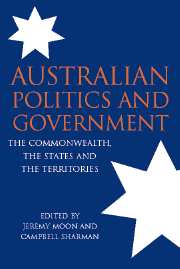Book contents
- Frontmatter
- Contents
- List of contributors
- List of figures and tables
- Acknowledgements
- 1 Introduction
- 2 The Commonwealth
- 3 New South Wales
- 4 Queensland
- 5 South Australia
- 6 Tasmania
- 7 Victoria
- 8 Western Australia
- 9 Australian Capital Territory
- 10 Northern Territory
- 11 One System or Nine?
- Note on Sources and Links to the Web
- Notes
- Appendix: Periods in Office
- References
- Index
5 - South Australia
Published online by Cambridge University Press: 05 September 2012
- Frontmatter
- Contents
- List of contributors
- List of figures and tables
- Acknowledgements
- 1 Introduction
- 2 The Commonwealth
- 3 New South Wales
- 4 Queensland
- 5 South Australia
- 6 Tasmania
- 7 Victoria
- 8 Western Australia
- 9 Australian Capital Territory
- 10 Northern Territory
- 11 One System or Nine?
- Note on Sources and Links to the Web
- Notes
- Appendix: Periods in Office
- References
- Index
Summary
South Australia enters the twenty-first century with uncertainty. Its government and political leadership shares with counterparts in every state the challenge of coping with the economic and social insecurity associated with globalization, competition and social change. But South Australia – with neither the population nor the natural resource base upon which other mainland states can draw – feels itself particularly vulnerable.
The affliction is compounded by being a little unfamiliar. While South Australian political developments have never had a dominating influence on national affairs, there have nonetheless been important periods when the state has generated ideas and inspiration disproportionate to its relative size.
Its colonial beginnings in 1836 deliberately eschewed the penal model that provided the foundational administrative and economic structures elsewhere in Australia. Promoting Benthamite liberal ideas, religious freedom and widespread land ownership, the founders attempted to implement a novel plan for the construction of a free settler society. When self-government was bestowed in 1856, it was under constitutional arrangements claimed to be ‘the most democratic in the British Empire’ (Howell 1986, 157). The colony became something of a democratizing pioneer, pushing ahead with the expansion of the franchise, and some of its policy innovations, like the ‘Torrens title’ system for land registration and conveyancing invented in 1858, were exported elsewhere. South Australian political leaders were arguably crucial contributors to the federation movement in the 1890s (Bannon 1994; Howell 1996). From the 1920s South Australian arguments were important in establishing a redistributive fiscal mechanism (not incidentally, to the state's advantage) within the increasingly Commonwealth-dominated system of public finance.
- Type
- Chapter
- Information
- Australian Politics and GovernmentThe Commonwealth, the States and the Territories, pp. 104 - 130Publisher: Cambridge University PressPrint publication year: 2003
- 1
- Cited by



